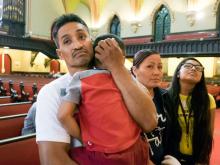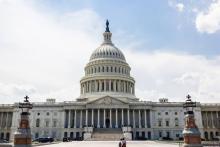Jesus

Jesus told his disciples to “take up their cross and follow me” a year before his trial and execution. And his disciples at that time would have heard it very differently from the way we interpret it today. To the disciples, a cross wasn't a symbol of atonement, forgiveness, or forbearance — it was an official mode of execution, by oppressors and occupiers. It was an instrument of terror. Jesus' words to the disciples were not just a warning. They were an exhortation to follow him anyway, in complete defiance of the very worst anyone could possibly do to us.

I ask myself how we got here, why the American church has hardened its hearts to refugees when one of the major themes of the Bible is welcoming the stranger. How did we lose trust in a vetting system that has worked for decades? How did we begin to see refugees as dangerous when there is no statistical evidence to back it up? How did we forget that so many of us are descendants of people who were oppressed and looking for a better life? How did we stop seeing the beauty of American culture as coming from a collision of cultures? How did we lose our way — did it happen overnight or has it been slowly brewing for a long time?

Jesus actively participated in the lives of everyone whom he met by offering them love, acceptance, and healing. He particularly sought out and served those whom religious folk deemed to be great sinners.

God of wholeness,
come and fill our hearts and minds,
and our bodies
with deep abiding love.

But Jesus said, if you would be perfect, go, and stop pretending racism doesn’t exist, stop supporting political leaders who lie and manipulate, stop being co-opted by political agendas, and stop slandering people who are different from you.

This Christmas season, we need to remember that Jesus was not white. And in solidarity with that truth, we need to make space in our Advent season for the church to openly lament that American Christianity has often stood on the side of the oppressor and not on the side of the oppressed.

God’s kingdom is a place of unlimited love and unending compassion. It’s a place where everyone is welcomed — especially the marginalized — and nobody is treated like an outcast.

@JesusofNaz316 has a funny-sad-outraged quality. He sometimes uses the platform for irony or jokes, but more frequently for protest — sometimes against general injustice, but more often against the hypocrisy of Christians. His account, which has more than 16,000 followers, has been active since 2010. He is followed by progressive clergy like Diana Butler Bass and Rachel Held Evens and rabbis Danya Ruttenberg and Jonah Geffen, along with theologians and pastors from across denominations.

The conversation isn’t just about guns, although that’s certainly a huge part of it. We need to look at the bigger picture of how we’ve made violence our norm, how we endorse and encourage it in so many ways.

The first element that gets blown up by the parable is the motive of the landowner. Sometimes preachers, trying to fill in the gaps in the story, will surmise something like, “So the landowner, needing more laborers to work the vineyard, went back to the marketplace,” but this distorts the parable.

Everyone deserves our love, especially those whom the “religious” people deem unworthy — tax collectors, Samaritans, lepers, the homeless, the beggars, the sick, the mentally ill, the despairing.

Art and Christianity give our lives import and meaning, irrespective of power, race, gender or class. Jesus did this when he overturned the Greek and Roman way of viewing the world, in which one’s social status was everything, and introduced the notion of the equal worth and dignity of all human beings. “Here there is no Gentile or Jew, circumcised or uncircumcised, barbarian, Scythian, slave or free, but Christ is all, and is in all (Col. 3:11),” wrote Paul. All people made in the image and likeness of God, “lovely in limbs."

One of the defining marks over time between denominations in the Christian world is how we interpret the Bible — the words and teachings of Jesus — and how we decipher his stories and actions. Today we’re examining Jesus’ life with a megaphone, and it seems like everyone has joined the conversation, not over a cup of a hot coffee or a meal, but at our keyboards and in our pulpits and Bible studies. We’ve gone from a faithful religion to a political and social religion, in which the teachings of Jesus are used by us to prop up whatever we are claiming in our latest argument.

Though they gave respectable answers, I was amazed no one directly quoted the Christian Gospels on the subject.
The Gospel of Mark provides one saying of Jesus directly applicable to this situation. But when we examine subsequent uses of that saying in the other Gospels, we can see why none of the 60 Minutes interviewees dared quote that particular verse.

In essence, we have struggled to understand the work and responsibility of Christian compassion in issues of healthcare and policy. Should this responsibility be shared by all and secured by the government, or should it primarily be the domain of people of faith and those moved by a higher calling to mercy and healing? With the new GOP Health Care Bill, and the ongoing debates about healthcare in America, Christians across the aisle struggle to evaluate how well we are doing at caring for the disenfranchised and the sick.

Power can be transformative, but only if power is suffused with love. As Andy Crouch has written, “Power at its worst is the unmaker of humanity—breeding inhumanity in the hearts of those who wield power, denying and denouncing the humanity of the ones who suffer under power.… Power, the truest servant of love, can also be its most implacable enemy.”

But the strong affirmation of Christ’s absence kept the early church from centralizing around Jerusalem. Without the body of Jesus to create a memorial, no land or language could monopolize claim to sacredness. Ascension, in one sense, is an abdication of worldly authority. It is the empowerment of everyone, no matter their land and language.

This past year, the depression I had suffered twenty years ago returned with a vengeance. I made plans to end my life. Friends begged me to seek help. And I did – eventually. But one of the primary reasons I delayed getting help was because I am a pastor. I agonized over the contradiction of my life. As a pastor, I was expected to have all the answers. As a person with untreated depression, I felt like I had nothing but questions. And I worried that acknowledging I have a mental illness would irreparably damage my relationship with the church

The American Church’s division in our understandings of Jesus neatly follow the fault lines of American society. We hunker in our social groups, worshiping isolated from each other, hearing from preachers who talk like us, and so we natural come to assume Jesus is like us, in talk and in thought.

I’m not here to argue about whether Paul’s point is a good one — by all accounts, he does a fine job telling the biblical story in a way his gentile listeners can understand. I, like Paul, am a Christ-follower. I’ve already bought what he’s selling. I’m asking about the way he makes his point — I’m pushing back against the notion that Christianity is an idea that can and should be argued in the public square.